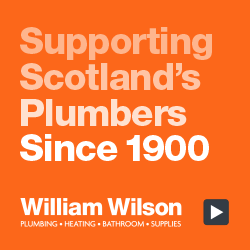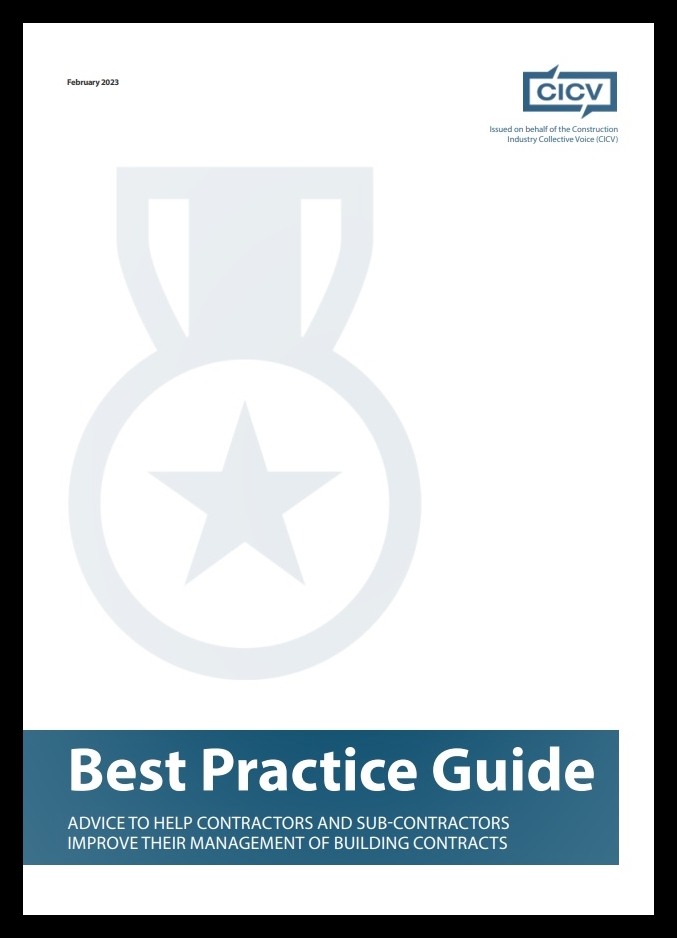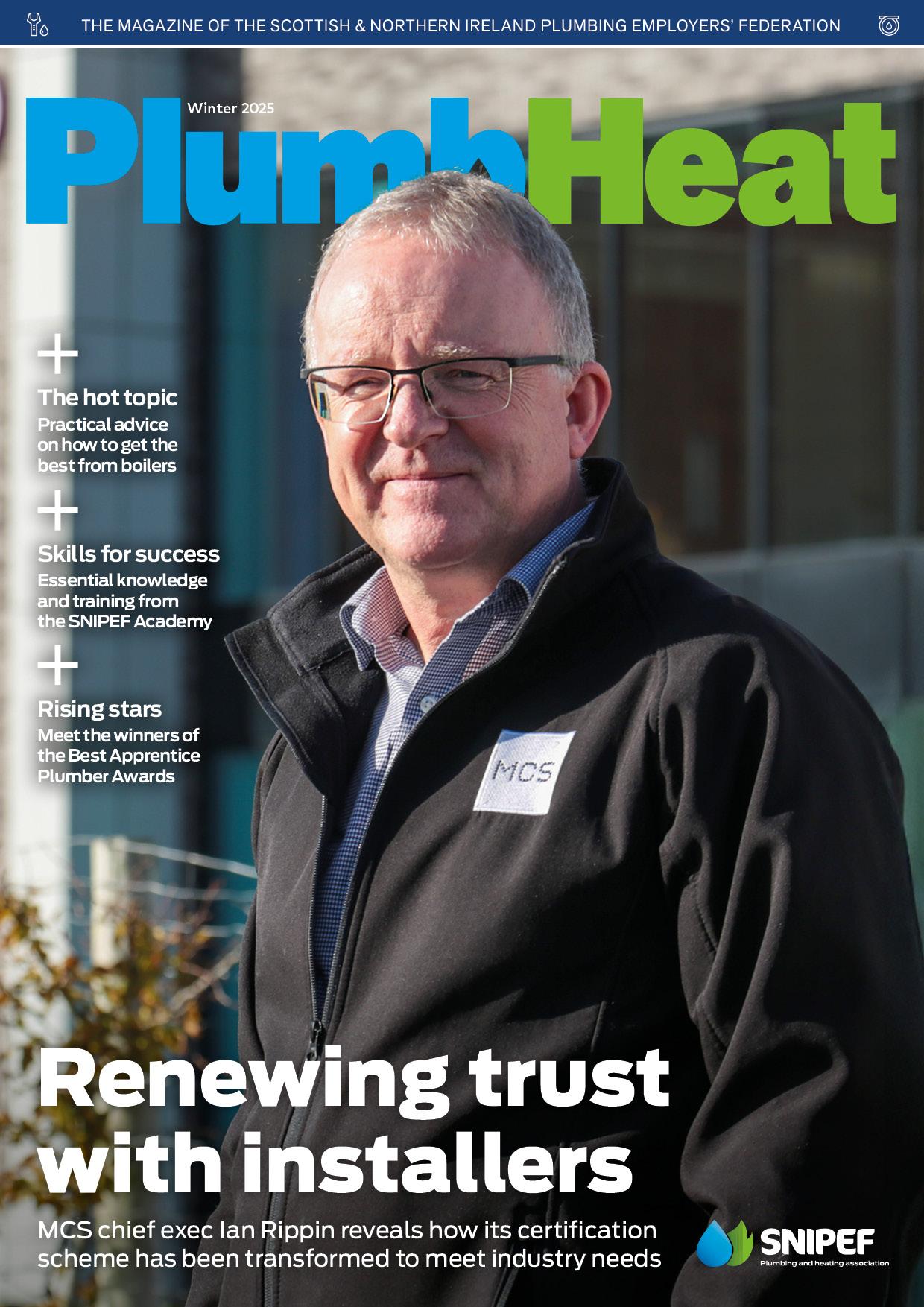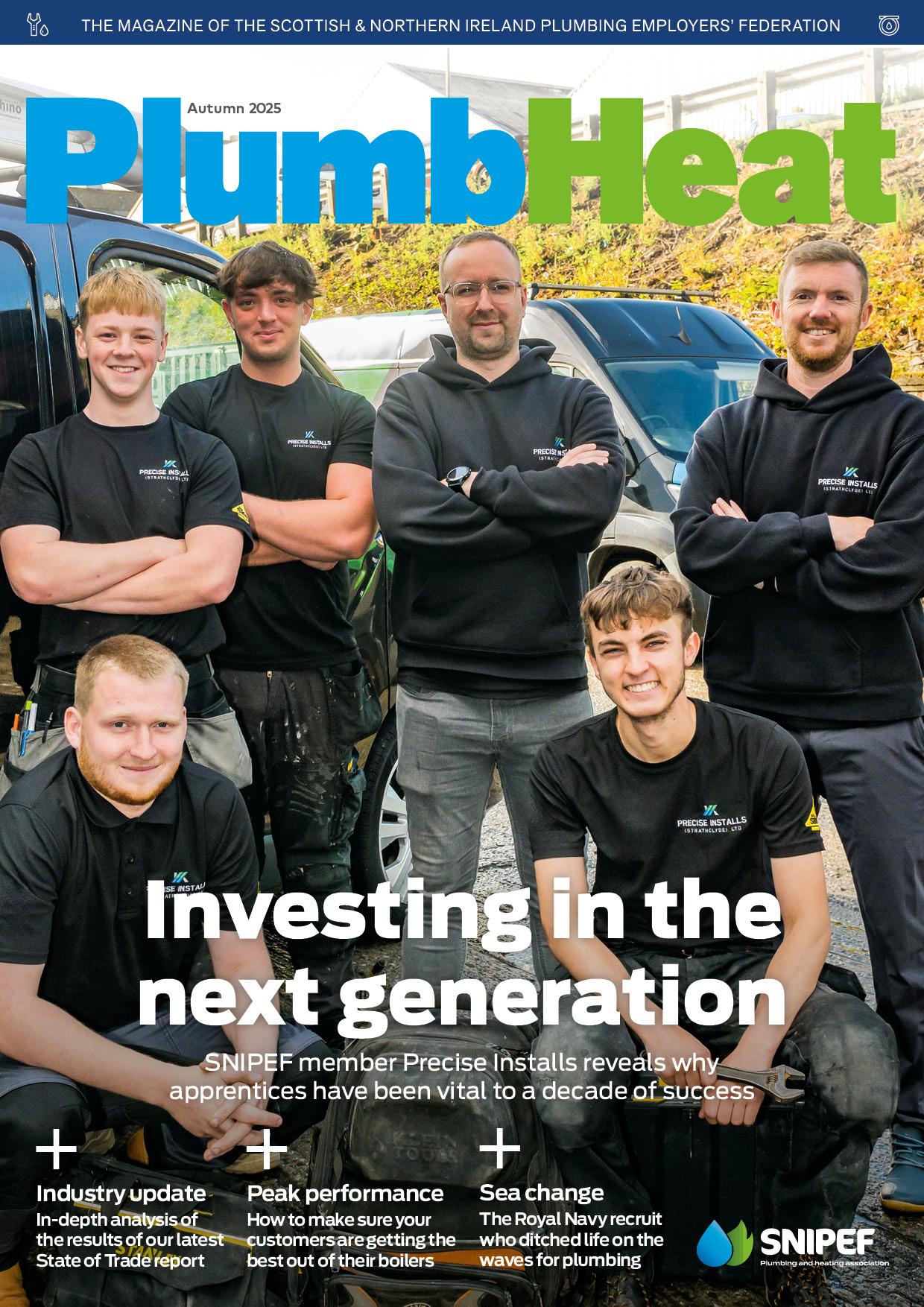Publications & Consultation Responses
Scottish Elections 2026: Supporting Apprenticeships. Fixing Scotland's skills shortage.
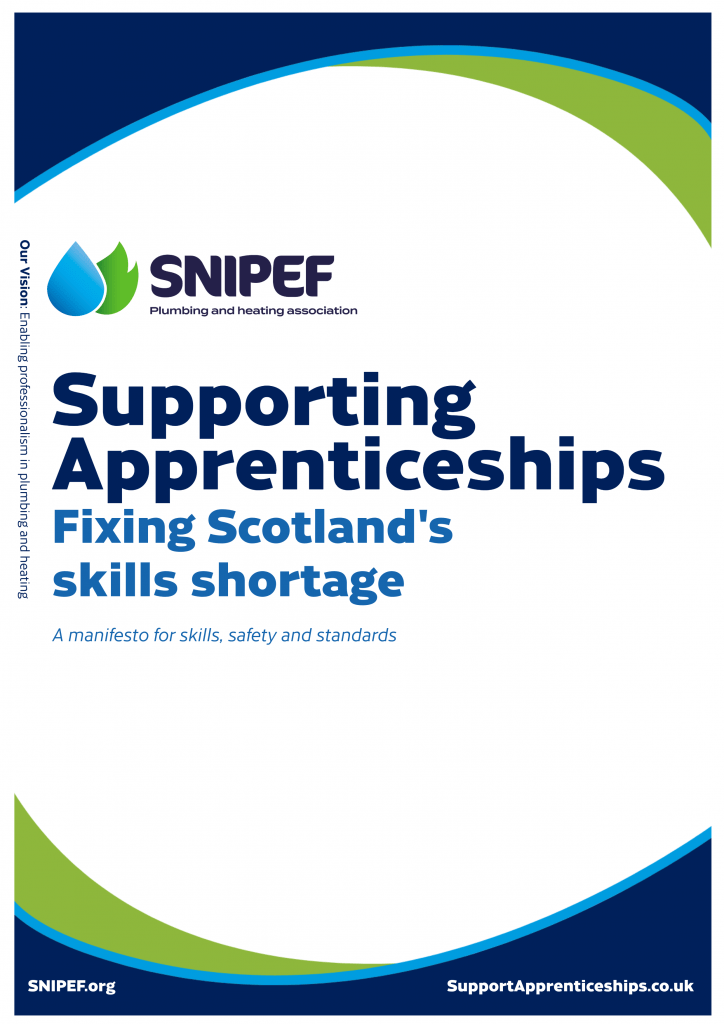
SNIPEF’s Supporting Apprenticeships: Fixing Scotland’s skills shortage manifesto sets out the urgent need to strengthen Scotland’s plumbing and heating skills pipeline through fairer funding, improved completion and sustained employer support.
Evidence from employer research in late 2025 shows recruitment intent is fragile, skills availability remains low and more than half of businesses are unlikely to take on an apprentice without additional support. At the same time, employers overwhelmingly back the four-year apprenticeship model as essential for maintaining safety, quality and professional standards across a safety-critical workforce.
The manifesto focuses on a single, outcome-driven objective: creating a balanced funding system that shares the real costs of training between government and employers while protecting high standards and improving completion. This includes extending regional employer incentives across the full four-year programme, offsetting wage and supervision costs for micro and SME businesses, and rewarding completion, retention and flexible entry routes into the profession.
Taken together, these measures are designed to increase apprenticeship recruitment, strengthen workforce capacity and support modern low-carbon careers, delivering long-term benefits for businesses, communities and the wider Scottish economy.
REPORT: SNIPEF State of Trade Survey Q4 2025
The Q4 State of Trade report remains Stable because workload and sentiment have improved modestly and cashflow has not deteriorated, while major disruption risks remain contained. The counterweight is a clear deterioration in margins and continued cost inflation, alongside persistent workforce constraints. The overall position is therefore stable in activity terms, but more pressured financially, with risks concentrated in profitability and skills capacity rather than immediate demand.
Cost pressures remain widespread in Q4, with 93% of firms reporting input price increases. While the share reporting significant increases eased slightly compared with Q3, inflationary pressure remains entrenched.
Confidence in the profession improved quarter on quarter, with 45% confident or very confident in Q4 (up from 33% in Q3), alongside reduced neutral and pessimistic responses. This suggests firmer short term sentiment despite margin pressure.
Workforce expansion remains cautious. The share likely to increase headcount eased slightly to 26% (from 29% in Q3), with 29% expecting staffing to remain the same. Intentions to increase plumbing and heating operatives remain lower at 17% (down from 24% in Q3), underlining continued reluctance to add skilled technical capacity.
Q4 shows modest improvement in activity and confidence, supported by slightly stronger workloads and a firmer order book balance, and a small uplift in on-time payment experience. However, the quarter is defined by a sharper squeeze on profitability, with a clear rise in firms reporting falling margins, and continued evidence of cost pressure and growing low-level project friction. The net shift is towards stable or slightly improved trading conditions, but with noticeably tighter financial headroom.
CONSULTATION: Procurement Reform (Scotland) Act 2014 Thresholds
The Scottish Government’s consultation on procurement thresholds under the Procurement Reform (Scotland) Act 2014 sought views on whether existing financial thresholds for regulated procurement and community benefits should be amended to reflect inflation and changing delivery models in public contracting.
SNIPEF's submission focuses on the practical implications for plumbing and heating employers across Scotland, the majority of whom are sole traders, micro businesses and small firms. We emphasise the importance of transparency, fair access to public sector opportunities and proportionate procurement processes, particularly at contract values where small businesses are most able to compete. We also highlight the critical role that community benefit requirements can play in supporting apprenticeships, skills development and long-term workforce sustainability in a safety-critical profession.
REPORT: Apprenticeships under Pressure (Employers Insights Research)

Apprenticeships Under Pressure: Why Scotland Must Act is SNIPEF’s comprehensive employer-insights report examining the state of plumbing and heating apprenticeships across Scotland.
Drawing on survey evidence from 188 businesses, it highlights the profession’s strong commitment to the four-year apprenticeship model while exposing significant financial, training and retention pressures that are reducing employers’ ability to recruit.
The report sets out where the system is working, where it is failing, and what reforms are needed to ensure a sustainable, high-quality pipeline of skilled workers for Scotland’s housing, public-health and net zero ambitions. Its purpose is to give government and industry a robust evidence base for action.
REPORT: SNIPEF State of Trade Survey Q3 2025
The Q3 2025 State of Trade for the plumbing and heating profession is rated Stable. After a softer second quarter, trading conditions have steadied, supported by a firmer pipeline of work and broadly resilient cashflow. Forward order books show a clear improvement, with more businesses reporting higher than expected workloads and fewer reporting lower than expected demand.
Cost pressures remain persistent. Almost all firms continue to face rising input prices, although most increases are described as slight rather than significant. Product availability is generally serviceable and project delays remain mostly minor, helping businesses maintain operational continuity despite ongoing inflationary strain.
Confidence within the profession has held steady on the quarter, although sentiment remains cooler than this time last year. Views of the wider UK economy are notably more pessimistic, reflecting the national backdrop of weak business confidence, modest growth and ongoing cost of living pressures.
Workforce capacity continues to be a challenge. Hiring intentions have steadied but remain cautious and firms are particularly hesitant to increase the number of plumbing and heating operatives they employ. Apprenticeship recruitment is subdued and the availability of skilled professionals remains tight across most regions.
Overall, Q3 presents a picture of a profession that has regained some footing after mid-year softening. Trading is stable, pipelines are firmer and operational pressures are manageable, yet the sector remains constrained by rising costs, skills shortages and a subdued national economic outlook.
CONSULTATION: Permitted Development Rights (PDR)
The Scottish Government’s Permitted Development Rights (PDR) consultation sought views on potential changes to planning rules to help tackle Scotland’s housing emergency and accelerate the rollout of low-carbon technologies, including air source heat pumps and heat networks.
SNIPEF welcomes efforts to streamline planning processes where it supports energy efficiency, decarbonisation, and access to affordable heating. Our submission focused on ensuring that any expansion of PDR maintains clear technical standards, protects consumers, and supports a skilled and qualified installer base.
We supported aligning Scottish regulations with UK-wide Microgeneration Certification Scheme (MCS) standards to ensure consistency and consumer confidence. SNIPEF also backed proposals allowing up to two heat pumps on detached homes, provided flexibility for heating and cooling installations, and advocated for simpler processes to connect buildings to heat networks.
However, we emphasised that competence and certification must remain central to any changes. PDR reforms should enable faster deployment of low-carbon technologies while ensuring installations are carried out safely, professionally, and to the highest technical standards across all regions of Scotland.
CONSULTATION: Tackling late payments in business-to-business transactions
The UK Government’s Late Payment Consultation proposes new legislation to improve payment practices, including stricter reporting requirements for large firms, stronger enforcement powers for the Small Business Commissioner, and potential reforms to construction retentions.
SNIPEF welcomes the renewed focus on addressing late and unfair payments, which continue to undermine small and specialist contractors across the construction sector. However, we highlight that the proposals remain too focused on large companies, with many payment issues arising further down the supply chain among medium-sized subcontractors.
We support statutory payment limits, stronger enforcement, and fairer retention practices, but stress that reforms must be practical, proportionate, and effective for SMEs. A truly fair payment culture must apply across all tiers of the supply chain, ensuring small plumbing and heating businesses are paid on time and can operate with confidence and stability.
Consultation Submission: Heat & Energy Efficiency Technical Suitability Assessment (HEETSA)
The purpose of this consultation was to explore the creation of a new assessment framework to provide households with impartial, practical guidance on energy efficiency and low carbon retrofit options.
SNIPEF believes that the ultimate outcome of this policy must be the creation of a system that supports consumers with clear, accurate and affordable advice, while recognising the central role of qualified installers in delivering safe and effective retrofit solutions. HEETSA must enhance, not duplicate, existing protections and ensure that professional expertise remains at the heart of decision-making.
SNIPEF welcomes the ambition to raise the quality and consistency of retrofit advice across Scotland, particularly as EPCs have well-recognised limitations. By combining impartial assessment with strong professional input, HEETSA has the potential to empower consumers, improve confidence in retrofit projects and accelerate the transition to low carbon heating.
In short, HEETSA must deliver a framework that is practical, affordable and trusted by households, while working in genuine partnership with the industry that will deliver it. Done right, this will support consumers to make better decisions, enable fair access to funding, and create the conditions for a skilled, future-ready workforce to help achieve Scotland’s net zero goals.
SNIPEF State of Trade Survey Q2 2025
The Q2 2025 State of Trade for the plumbing and heating profession is rated Stable to Weak, marking the first slight move away from the steady conditions seen earlier in the year. While many businesses remain operationally resilient, the signs of softening first reported in Q1 have become more widespread across key indicators.
Fewer businesses are trading above expectations, and a growing number report quieter workloads. Forward-looking confidence has also weakened, with just 17% of firms expecting an improvement in order books, while 37% say future workloads have already dropped. Profit margins continue to tighten, driven by rising input costs and ongoing payment delays.
Workforce pressures remain severe. Skilled labour shortages persist, with only 4% of firms reporting high availability. Most businesses remain unlikely to recruit apprentices, highlighting ongoing concerns about training capacity and future skills supply.
Confidence in both the profession and the UK economy has continued to deteriorate. While smaller, domestic-focused firms are still holding firm in terms of day-to-day operations, the profession as a whole is becoming increasingly cautious. The latest results suggest that stability is giving way to sustained pressure, with margins, workforce capacity and future workload all under growing strain.
Start at Home Report
By enabling heating engineers to install heat pumps in their own homes, the 'Start at Home' project offers a practical solution to build a confident and competent low-carbon heating workforce.
This project, in partnership with Nesta, piloted a practical solution to bridge the gap between training and real-world installation – a common barrier in the industry – by allowing newly trained installers to fit an air source heat pump in their own home. This provided them with practical experience in a low-risk environment, helping them become more confident and competent when entering the retrofit heat pump market. Our report shows the findings of this project.
SNIPEF State of Trade Survey Q1 2025
The Q1 2025 State of Trade for the plumbing and heating profession is best described as Stable, marking a modest decline from the “Stable to Strong” performance seen in late 2024. Trading conditions remained steady overall, though fewer businesses reported being busier than expected and more cited quieter periods. Profit margins showed signs of strain amid rising input costs and persistent cashflow challenges.
Ongoing pressures include payment delays, especially for those dealing with Tier One and Two contractors, and a persistent shortage of skilled professionals. Confidence in the profession remains relatively strong but is showing signs of softening. Meanwhile, optimism about the UK economy continues to decline, with nearly half of respondents expressing pessimism.
Employment intentions remain subdued. Most businesses are not planning to hire or recruit apprentices in the short term, which continues to challenge long-term workforce sustainability. As in previous quarters, smaller, domestic-focused firms remain the most resilient, benefiting from more reliable workflows and customer relationships, while larger businesses face greater volatility from market and operational disruptions.
Education Scotland: External review of Modern Apprenticeship delivery by SNIPEF Training Services
SNIPEF Training Services (STS) recently received an external review from HM Inspectors to evaluate the quality of provision for Modern Apprenticeship (MA) providers.
During the review, a team of HM Inspectors evaluated the quality of training provision and the experiences of apprentices and gathered the views of key stakeholders such as employers. The team met with staff, apprentices and other stakeholders. Discussions focussed on the quality of training delivery, how well the needs of apprentices are met and the approaches to improving the quality of provision.
STS received the following grades for the three categories:
Leadership and Quality Culture: Good
Service Delivery: Very Good
Safeguarding and meeting the needs of apprentices: Very Good
Consultation submission: Tertiary Education and Training (Funding and Governance) (Scotland) Bill
The purpose of this consultation was to simplify the funding landscape for post-school education and training. It was introduced on 5 February 2025.
SNIPEF believes that the ultimate outcome of this legislation must be the creation of a simplified, learner-focused system that genuinely values and supports both vocational and academic pathways. A key part of this is ensuring that apprenticeships and employment-based learning are fully integrated into the strategic vision for tertiary education, not as secondary options, but as equal and essential components of a diverse and future-ready workforce.
SNIPEF welcomes the Bill’s initiative to establish a statutory framework for apprenticeships in Scotland, recognising their critical role in driving economic growth and addressing skills shortages. This formal acknowledgment underscores the importance of apprenticeships and aligns with our commitment to fostering high-quality vocational training.
In short, the Bill must deliver tangible, lasting benefits for learners, employers, providers and the broader economy, ensuring that Scotland’s skills system is fit for the future, adaptable to change and focused on delivering opportunity for all.
SNIPEF State of Trade Survey: Q4 2024
The Q4 2024 State of Trade results for the plumbing and heating profession remain Stable to Strong. Businesses reported steady or busier-than-expected trading conditions, and many achieved stable or improved profit margins through effective cost management despite ongoing increases in material prices.
Persistent challenges continue to affect the profession, including widespread workforce shortages and payment delays, particularly for larger firms working with Tier One and Two contractors. Confidence in the profession remains robust, though overall economic outlook has worsened, with many expressing pessimism about the UK economy.
Employment growth remains cautious. Most businesses do not plan to expand their workforce or take on apprentices, which could exacerbate the ongoing skills shortage. Smaller, domestic-focused companies continue to outperform, benefiting from more reliable payments and a stable client base, while larger firms and subcontractors face ongoing pressures related to delayed payments, non-payment, and supply chain instability.
Consultation Submission: Support for low carbon heating in residential buildings
The purpose of this consultation is to discuss a number of key questions and evaluate support options for low carbon heating technologies within the residential sector. The consultation sought views on a new domestic low carbon heat support scheme, exploring a range of topics, including:
- The type of low carbon heat technologies eligible for future support
- Building efficiency, suitability and eligibility requirements
- Consumer considerations and protections
- Financial assistance options
- Supply chain and industry skills to support future scheme delivery
SNIPEF State of Trade Survey: Q3 2024
To gain a comprehensive understanding of the current plumbing and heating industry landscape, SNIPEF launched its longitudinal State of Trade research project. This project aims to assess trading performance, payment practices, profit margins, supply chain issues and the profession’s future outlook from an employer’s perspective.
The Q3 2024 State of Trade results for the plumbing and heating profession are Stable to Strong. Strong demand has resulted in many businesses being busier than expected. Profit margins are stable for most firms despite universal increases in material costs. However, significant challenges persist, including payment delays, especially with larger contractors and a shortage of skilled professionals.
Employment growth is cautious, with few businesses planning to increase staff or recruit apprentices, potentially worsening the skills gap. Smaller, domestic-focused companies are performing better overall, while larger firms face more pronounced payment and supply chain issues.
Meeting Scotland’s Retrofit Challenge: Solutions from the Industry
One year after its inaugural session, the Retrofit Roundtable, supported by SNIPEF and 12 industry partners, has urged the Scottish Government to swiftly implement their suggestions to ensure Scotland meets its net-zero and fuel poverty targets. Their newly released report emphasises a "fabric first" retrofit approach and calls for a dedicated ministerial group and a Retrofit Delivery Plan to address the ongoing energy inefficiency in homes.
SNIPEF Annual Review 2023
A review of SNIPEF in 2023, including its financial summary, an introduction from President George Baxter and a corporate review from Fiona Hodgson, Chief Executive.
Consultation Submission: Clean Heat Market Mechanism Delay
SNIPEF supports the proposed postponement of the Clean Heat Market Mechanism (CHMM) to April 2025, highlighting the need for additional preparation and evaluation of the UK housing stock for heat pump feasibility. This delay will address misinformation and improve communication, ensuring a smoother transition to low-carbon heating solutions. The adjustment aims to enhance consumer confidence and align with national low-carbon goals by refining the CHMM’s framework and operational readiness.
Consultation Submission: MCS MIS-3005D
MCS undertook this consultation to refine and enhance the standards outlined in MIS 3005-D, focusing on the future of heat pump systems in homes and buildings. The consultation sought input on pivotal changes, including defining hybrid heat pump systems, adjusting the criteria for heat pump selection to potentially remove the 100% calculated heat loss requirement, and setting a new minimum of 55% peak power output for heat pumps at a 55°C flow temperature under design conditions.
Consultation Submission: Delivering Net Zero for Scotland's Buildings
The consultation presents far-reaching proposals, including phasing out polluting heating systems by 2045 and introducing rigorous energy efficiency standards. This key change is designed to lower energy bills, tackle fuel poverty, and promote healthier living spaces. Your insights are crucial in influencing these developments.
Consultation Submission: Provisions of the Education Bill (Scotland)
The purpose of this consultation is to seek views on proposals related to replacing the Scottish Qualifications Authority and approaches to maximize the role of inspection in supporting and improving education in Scotland. It aims to gather feedback to inform the development of the Education Bill, focusing on establishing a new qualifications body and introducing a new approach to education inspection. The consultation seeks to ensure that qualifications meet the needs of users and the system is transparent, involving stakeholders in decision-making. Additionally, it addresses improving educational outcomes, trust, and confidence in national education organizations through reform.
Consultation Submission: Clean Heat Market Mechanism
The CHHM aims to incentivise the UK’s heating industry to invest in making heat pumps an increasingly attractive and affordable choice for families and businesses.
The scheme would require fossil fuel boiler manufacturers (obligated parties) to install a certain number of heat pumps proportional to their fossil fuel boiler sales. It is intended to incentivise industry to invest and innovate throughout the supply chain.
Consultation Submission: Building Warrant Fees
This consultation aimed to gather opinions on the proposed enhancements to Scotland's building warrant fees. The objective was to reinforce the building standards system and formulate a new fee model for building warrants in Scotland.
Consultation Submission: Draft Energy Strategy and Just Transition Plan
Between January and May 2023, a consultation from the Scottish Government on its draft Energy Strategy and Just Transition Plan saw submissions from communities, businesses and the public. Alma Economics was commissioned to analyse the 1,598 responses, which found that overall, respondents wanted a fair distribution of benefits and costs of decarbonisation, governmental support at all levels, and upskilling of the workforce.
The consultation contained 50 questions, of which SNIPEF responded to ten. To aid brevity, only outcomes to questions that SNIPEF answered have been included. The full consultation outcomes report can be found on the Scottish Government’s website.
Consultation Submission: Proposed changes to the Microgeneration Certification Scheme (MCS)
MCS published a six-week consultation on proposals to redevelop the scheme in June, seeking views from contractors, consumers, manufacturers and independent experts on how it should shape the future of MCS. In October, MCS published the outcomes of the consultation.
Enabling Professionalism: SNIPEF Strategy 2023-25
As SNIPEF commemorates its centenary, we recognise plumbing's enduring impact on society's progress and well-being. Our new strategy aims to help us move toward a low-carbon and sustainable future, placing Northern Ireland and Scotland's plumbing and heating industries at the forefront.
Our new strategy places professionalism, advocacy, and inclusivity, at its core. With 750 member companies and 5,000+ skilled operatives, we amplify our industry's voice and influence. We spearhead the nation's low-carbon ambitions by equipping professionals, promoting green solutions, and leading in safety-critical endeavours.
SNIPEF Annual Review 2022
A review of SNIPEF in 2022, including its financial summary, an introduction from President Jim Butter and a corporate review from Fiona Hodgson, Chief Executive.
Best Practice Guide: Advice to help contractors and sub-contractors improve their management of building contracts.
(Published by the Construction Industry Collective Voice)
Experts in the industry have prepared this Best Practice Guide to provide real-life examples of improving practice across the entire contractual chain.
Best practice advice covers important areas, such as:
- Tender qualifications
- Contract amendments
- Payment schedules
- Payment applications
- Variations
- Retentions
- Fluctuations
- Notices
- Conflict Avoidance Process (CAP)
Research: Payment and cashflow in construction
This research, published by the Construction Industry Collective Voice, was conducted to help gain an accurate picture of the current financial landscape in the Scottish construction industry.
Have you missed the Payment and Cashflow webinar?
Don't worry; catch up and watch the Podcast here
